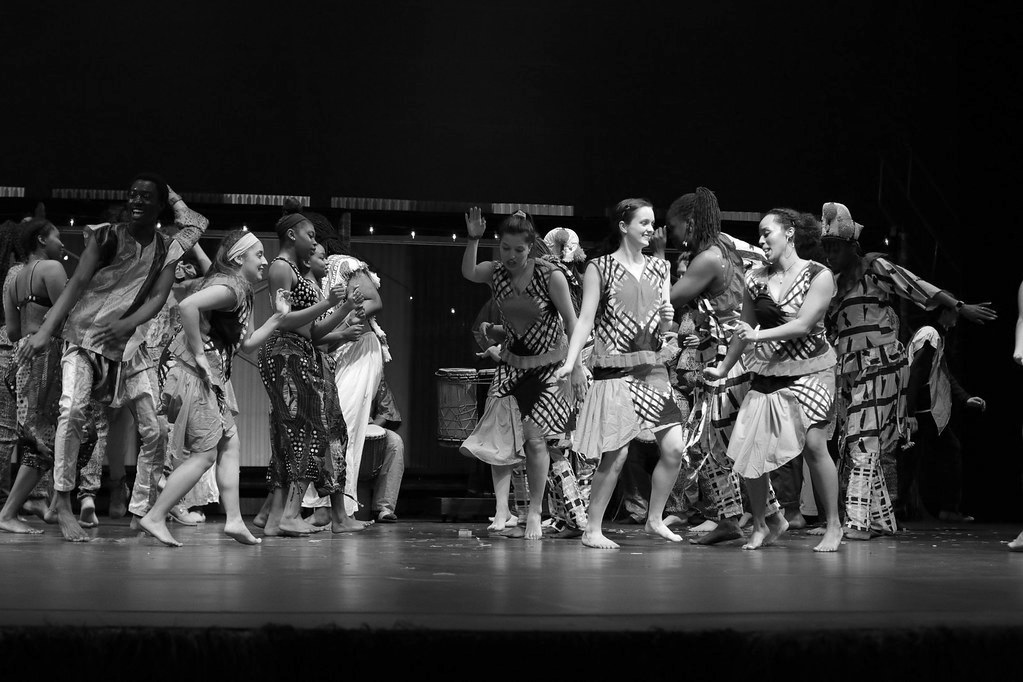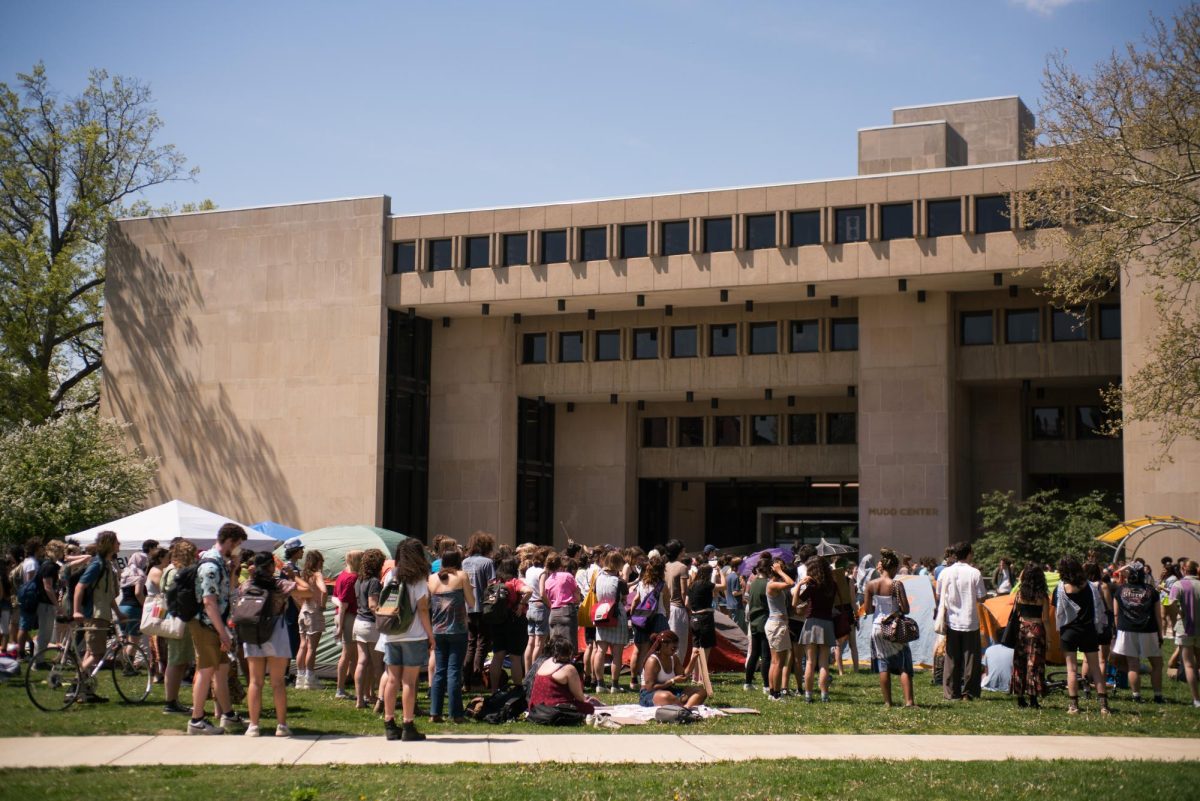I have only taken two Dance classes here at Oberlin. The first was awful. For two years, I wrote off dance at Oberlin. Finally, this semester, I took Dances of the African Diaspora with Professor Talise Campbell, a visiting assistant professor of Africana Studies and Dance. I only wish I’d done it sooner. Let me say this: Professor Talise was one of the best teachers I’ve ever had the honor of working with. The community she fostered and the lessons she imparted on us were invaluable. I cannot imagine Oberlin without her.
That’s why I was shocked to receive an email from my classmate and Djembefola, College fourth-year Chudi Martin Jr., informing us that this year, Professor Talise would have to compete for the Visiting Assistant Professor of African and Dance role, which she had held for 7 years. There would be teaching demonstrations and artistic presentations for each of the candidates over the coming months. Chudi prompted us to attend and write emails advocating for Professor Talise to remain at Oberlin and for the institution of a tenure track for Afro-diasporic dance.
Would they really replace her? It didn’t make any sense to me. Her classes were always full — more than full; there were always students who audited. In fact, why was she not tenured already?
Another aspect was that Associate Professor of West African Drumming Weedie Braimah, instructor of the Djembe Orchestra and Professor Talise’s husband, stated his plans on no uncertain terms: “She’s not here, I’m not here. There’s no ifs, ands, or buts.” This would be a major loss for not only the Dance department, but the Conservatory and Africana Studies department as well.
I thought this must be some bureaucratic nonsense. There was no way they would let her go, not if they were smart. But, as the weeks wore on, I saw the stress of it weighing on my teacher and those closest to her, and I realized my unperturbed optimism may have been naive. The night before her teaching demonstration, Instagram was abuzz with stories, reminding everyone to come support our beloved professors. We all set our alarms for 8:30 a.m. for her 9 a.m. demonstration. The morning was hot. The room was packed. Fifty, maybe 60 faces. Some I recognized, most I didn’t. All were unified in fond respect for these two individuals. The class was great. I left in high spirits, and sent off my email of support, thinking there was no way they could see that class and still let her go.
I wasn’t the only one. Later, Chudi would say he thought the same thing.
“Overwhelmingly, students were like, ‘We want Professor Talise to stay’ … and so in my mind, going into that, I was like, ‘There’s no way that they won’t get hired again.’ And then we get the news,” he said.
Professor Talise and Professor Weedie would not be returning. But why?
Apparently, that was the question of the hour. I sat down with Professor Talise, Professor Weedie, Chudi Martin Jr., and Professor Talise’s Teaching Assistant, College fourth-year Isaiah Schuham-Anders, to discuss. Neither Professor Talise nor her colleagues have been given a reason as to why she was let go.
“Students will feel more settled if at least the Africana Studies Department can come to us and say, ‘We know what this thing is [why she was let go], we can’t necessarily divulge it, but it’s in good faith,’” Martin said. “And that is something that hasn’t happened.”
Professor Talise is not just a Dance professor; she is also a professor of Africana Studies. Yet, allegedly, the Africana Studies department felt that they were left out of conversations and that in the end it was not a unanimous decision.
Was the Dance department unaware of the interdisciplinary nature of Professor Talise’s class? The Africana Studies department is not the only academic discipline harmed by Professor Talise and Professor Weedie leaving Oberlin. Conservatory students have also greatly benefited from the intersectional programs these professors have built from the ground up. With Professor Weedie leaving, the future of Oberlin’s Djembe orchestra looks uncertain.
“Weedie is really the backbone of the orchestra,” Martin said. “He really serves as our ability to have live music in the classes. … So it’s really a two-package deal that Oberlin doesn’t realize they’re missing out on.”
Another person caught in the messiness of this process is the new hire, Thomas Talawa Prestø.
“I feel it’s a bad situation for [Prestø] because he would be a good addition, but there’s no replacement for what Professor Talise and [Professor] Weedie have brought to Oberlin,” Martin said. “I think students are going to be like, ‘You know, what, if it’s not Ms. Talise we don’t want it.’ … I feel like it’s ultimately saying, ‘Two Black, Afro-diasporic dance teachers cannot be in the department at the same time.’”
By disrupting the community and replacing the only Black dance professor in the department with another Black professor, the school is further alienating students of color. This is to say nothing of the fact that Oberlin employs non-Black tenured professors in Black art forms.
“Black students were already reluctant to engage in the Dance department,” Martin said. “It’s a real critical moment for engagement of Black students in the department as a whole, and something that could be at a major loss for the future for a very, very long time.”
Oberlin does not need another instance of failing to meet their purported values.
“That’s a part of the mission of the College, is building this community as a part of the whole diversity, equity, and inclusion missions … people write these things, but where’s the action? …Where’s the proof?” said Professor Talise.
Despite what was, in Braimah’s words, “the biggest insult, and a slap in the face,” there may be hope for his and Campbell’s places at Oberlin in the future. There are some preliminary talks about Professor Talise being in the Conservatory and Africana Studies, but moved out of the dance department completely.
According to Martin, Professor Talise could be open to this in the future, but she said, “I don’t want to be in any institution where I don’t feel valued. And what I do is valuable…I do this for the students.”
While the Dance department and Oberlin as an institution may not be showing her the respect she deserves, there is no shortage of student support for the value she brings to students both in and out of the classroom.
“[I] definitely would not have been the person I am today without taking her classes and learning her lessons,” Schuham Anders said.
I’m beginning to think the same might be true for me. Professor Talise and Professor Weedie are foundational to the Oberlin community. Letting them go was a mistake, especially given the way it was handled. If you have also learned and benefited from these professors, let it be known. Write emails to the Dean’s Office advocating for their return and the institution of a tenure track for Afro-diasporic dance.
And to Professor Talise and Professor Weedie, on behalf of the student body: thank you. We’ve learned so much from you, and those lessons will carry through over a lifetime. Know that you will be greatly missed on campus, and we won’t stop fighting for your return. Best of luck in the next chapters of your lives. Above all else, we love you, and we appreciate all you have given us.










